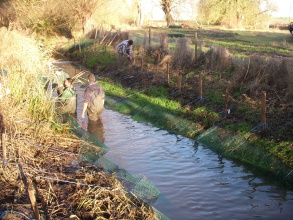Case study:Hoffer Brook
This case study is pending approval by a RiverWiki administrator.
Project overview
| Status | Complete |
|---|---|
| Project web site | |
| Themes | Habitat and biodiversity, Hydromorphology |
| Country | England |
| Main contact forename | Ruth |
| Main contact surname | Hawksley |
| Main contact user ID | User:RuthHawksley |
| Contact organisation | Wildlife Trust for Cambridgeshire |
| Contact organisation web site | http://www.wildlifebcn.org |
| Partner organisations | South Cambs DC, Environment Agency |
| Parent multi-site project | |
| This is a parent project encompassing the following projects |
No |
Project summary
River restoration including use of plastic mesh to stabilise silt bed before bed raising with gravel. Creation of point bars, bank reprofiling and rebuilding and fencing were also part of the project.
Monitoring surveys and results
Invertebrate monitoring prior to work found only worms and leeches. Freshwater shrimp and blackfly larvae colonised very rapidly and a few months later mayfly larvae, caddis larvae and water beetles were also present.
Lessons learnt
So far the mesh is working well, and unlikely to fail for a long time. It will be interested to revisit in 10 or 20 years to see what happens to the new gravel bed. Invertebrates colonised the new habitat quickly and it is hoped that trout will spawn there one day.
Cattle drinks were created with a gravel bed and fencing - in hindsight more gravel in each would have been better.
Image gallery
|
Catchment and subcatchment
Site
Project background
Cost for project phases
Reasons for river restoration
Measures
MonitoringHydromorphological quality elements
Biological quality elements
Physico-chemical quality elements
Any other monitoring, e.g. social, economic
Monitoring documents
Additional documents and videos
Additional links and references
Supplementary InformationEdit Supplementary Information
| ||||||||||||||||||||||||||||||||||||||||||||||||||||||||||||||||||||||||||||||||||||||||||||||||||||||||||||||||||||||||||||||||||||||||||||||||||||||||||||||||||||||||||||||||||

